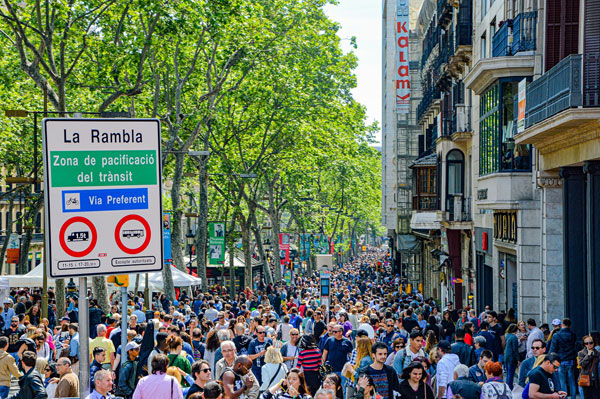Massive protests erupt across Spain as citizens demand urgent action on uncontrolled tourism surge and the housing crisis

[An overcrowded street in Spain due to over-tourism, Photo Credit to Pixabay]
Massive nationwide protests against overtourism have erupted across Spain, with local citizens demanding that the government take action against the issue of unchecked growth of short-term tourist rentals, which has aggravated the housing crisis.
According to the Bank of Spain, the country faces a housing deficit of 500,000 homes.
Thousands of outraged protesters rallied in over 40 cities, from major cities to islands and tourist hotspots on the coasts.
In Palma de Mallorca, an island that is one of the top tourist spots, signs bearing slogans such as “Mallorca is not for sale”, “No houses without people, nor people without houses”, could be read.
Similarly, in the Canary Islands, demonstrators came together around the slogan “Canaries have a limit”.
The message is clear - the Spanish communities have had enough of being displaced by waves of tourists.
With backing from the country’s major labor unions and housing advocates, the scale of the demonstrations highlights how the housing crisis is a "symbol of inequality" in the rapidly growing economy, where the people feel "left behind as the benefits fail to trickle down to working residents."
150,000 demonstrators packed the streets in the capital city of Madrid alone, chanting “Get AirBNB out of our neighborhoods!”
These demonstrations reflect deep national frustration with the systemic failure to protect affordable housing, which is seen as a fundamental and basic, social human right.
Spain is the second most visited country in the world, and saw a record of 94 million foreign tourists visiting in 2024.
The tourism sector accounts for 13% of the nation’s GDP, with foreign spending spending amounting to around $130 billion last year.
However, this boom also brought unintended consequences- congestion, overcrowding, and a surge in housing costs for the local citizens.
Residents are being negatively affected by rising rents being hiked and leases not being renewed as housing buildings are turned into short-term rentals for tourists.
Platforms such as AirBNBs are highly profitable, pose lower financial risks, and involve fewer legal obligations for property owners.
The Socialist Prime Minister of Spain, Pedro Sánchez stated "there are too many Airbnbs and not enough homes", vowing to stop this rampant, uncontrolled expansion of the use of properties for tourism.
The nation’s outcry has succeeded in getting the government to listen and act.
The marches have forced the hands of the government, who have responded with policy shifts.
Foremost among these is a crack down on AirBNB listings, with the government ordering for the removal of roughly 66,000 properties under the grounds of breaching regulations for tourist accommodations, with a license number either not being provided or the wrong one being given, and it not being clearly shown whether the estate is rented professionally or as a private individual, by the owner.
Previously, a Madrid court ruled that AirBNB must delist all the properties that have been cited by the Ministry of Social Rights, Consumer Affairs, and 2030 Agenda from the market.
The decision was seen as a major victory for all the Spanish citizens fighting for the right to housing, symbolizing how economic interest cannot be placed above housing.
Local governments are also taking measures.
For example, acknowledging the furious backlash, Barcelona’s local authorities pledged to “phase out 10,000 short-term rental permits by 2028”.
In response, AirBNB has sought cooperation with local authorities to ensure that property owners comply with the regulations, but have said they would appeal against the local court’s rulings, claiming there was no evidence of hosts violating the rules.
The multi-billion dollar rental platform also took aim at Spain’s broader housing crisis, asserting that the root cause is a lack of supply.
AirBNB contended that simply regulating the platform’s properties won’t “alleviate housing concerns or return homes to the market – it only hurts local families who rely on hosting to afford their homes and rising costs” .
Comprehensive housing reforms are urgently needed to effectively tackle this dire crisis.
A sustainable balance that ensures responsible tourism without undermining the right to housing must be the focus of Spain.

- Jaewon Lee (Jayden) / Grade 9
- Crean Lutheran High School

![THE HERALD STUDENT REPORTERS [US]](/assets/images/logo_student_us.png)
![THE HERALD STUDENT REPORTERS [Canada]](/assets/images/logo_student_ca.png)
